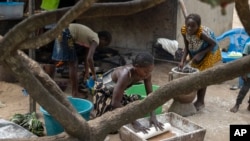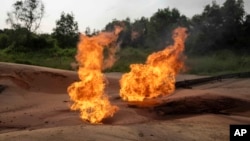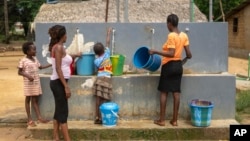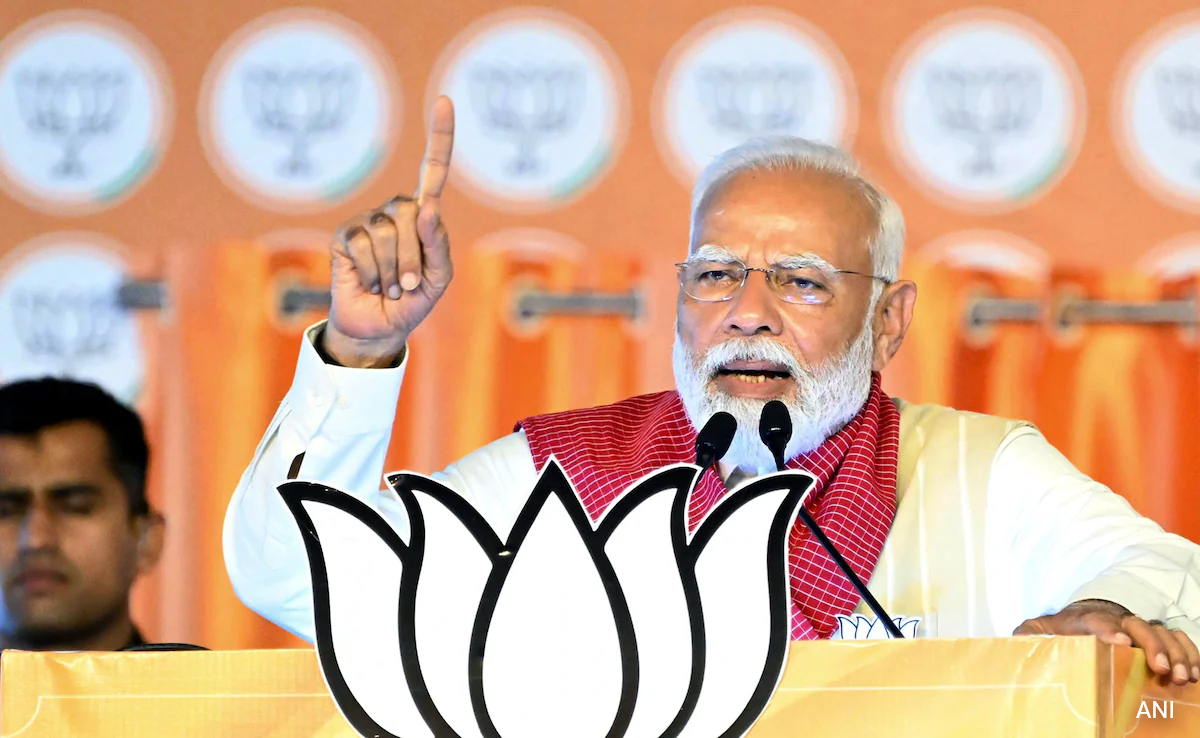The looming presence of oil drilling along the road from Adore Ngaka’s home is a daily reminder of what he has lost. He said mining in his village in western Congo has polluted the soil, withered crops and forced the family to use up their savings to survive.
Pointing to a stunted ear of corn in his garden, the 27-year-old farmer said it was now about half the size it was before oil operations expanded in his village of Tshiende nearly a decade ago.
“It keeps us in poverty,” he said.
Congo is a mineral-rich country in central Africa and is also believed to have large oil reserves. Drilling has so far been limited to small areas in the Atlantic and offshore, but that is expected to change if the government succeeds in auctioning 30 oil and gas blocks spread across the country. Leaders say economic growth is vital for poor people, but some communities, human rights groups and environmental watchdogs warn that expanded drilling will harm the landscape and human health.
Since Franco-British hydrocarbons company Perenco began drilling in the Moanda area in 2000, residents say pollution has worsened, with spills and spills degrading soil and flaring – the deliberate burning of natural gas near drilling sites – polluting their breath air. They said there was little oversight by the Congolese government.
Perenco says its extraction method adheres to international standards, poses no health risks and has minimal contamination. The company also said it would be willing to support a power plant that would use natural gas, thereby reducing flaring. The government did not respond to questions about the proposed factory.
Congolese Oil and Gas Minister Didier Boudinbou said the government is committed to protecting the environment.
Congo is home to much of the Congo Basin Rainforest, the world’s second largest rainforest and much of the world’s largest tropical peatland, consisting of partially decomposed wetland plant material. Together, they capture large amounts of carbon dioxide—about 1.5 billion tons per year, or about 3% of global emissions. More than a dozen parcels of land up for auction overlap with peatland and rainforest reserves, including Virunga National Park, home to some of the world’s rarest gorillas.
The government says reserves in the 27 available oil blocks are estimated at 22 billion barrels. Environmental groups say auctioning off more land for drilling will have consequences in Congo and abroad.
“Any new oil and gas project anywhere in the world will exacerbate the climate and nature crisis we are in,” said Mbong Akiy Fokwa Tsafak, Greenpeace Africa program director. She said Perenco’s operations did nothing to alleviate poverty and instead Deteriorating the ecosystem and placing a burden on community life.
Environmental activists say Congo has huge potential to develop renewable energy, including solar power and small hydropower. It is the world’s largest producer of cobalt, a key ingredient in electric vehicle batteries and other products critical to the global energy transition, although cobalt mining also presents environmental and human risks of its own.
Boudinbu said now is not the time to give up on fossil fuels as the country is still dependent on them. In the long term, dependence on fossil fuels will be phased out, he said.
Moanda is rich in biodiversity and borders the Mangrove National Park – the country’s only marine protected area. Pelenko has been under scrutiny for years, with reports from local researchers, aid groups and the Congolese Senate on contamination dating back more than a decade. Two civil society organizations, Sherpas and Friends of the Earth France, filed a lawsuit in 2022 accusing Perenco of pollution caused by oil extraction; the lawsuit is still pending.
The Associated Press spoke to dozens of residents, local officials and human rights groups during a rare international media visit to the oilfield, which includes two villages near the drilling. Residents say drilling has moved closer to their homes and they regularly see pipes rupture, allowing oil to seep into the soil. They blame air and ground pollution for making it difficult to grow crops and causing health problems such as rashes and respiratory infections.
They said Perenco responded quickly to leaks and spills but failed to address the underlying issues.
AP reporters visited drilling sites, some just a few hundred meters from homes, where pipes were exposed and corroding. They also found that at least four locations were flaring natural gas, a technique that controls pressure by burning natural gas and is often used when collecting the gas is impractical or unprofitable. The AP found no active leak sites.
Perenco burned more than 2 billion cubic meters of natural gas in Congo between 2012 and 2022, with a carbon footprint equivalent to that of about 20 million Congolese people, according to the Environmental Investigative Forum, a global alliance of investigative journalists on the environment. The team analyzed data from Skytruth, an organization that uses satellite imagery to monitor threats to Earth’s natural resources.
According to the International Energy Agency, natural gas is mainly composed of methane, and burning it emits carbon dioxide, methane and black soot, which is harmful to health.
In the village of Kinkazi, locals told The Associated Press that Perenco buried chemicals in a nearby pit for years, where they seeped into the soil and water. They showed photos of what they said were toxic chemicals before they were buried and took reporters to where they said they were dumped. They said it took four years of community protests and strikes before Perenco disposed of the chemicals elsewhere.
Most villagers declined to give their names, saying they feared a backlash from the company that provides temporary workers. Minutes after an AP reporter arrived in one village, a resident said he received a call from a Perenco employee asking about the purpose of the meeting.
Gertrude Tshonde, a farmer who was willing to speak, said Perenco began dumping chemicals near Kinkazi in 2018 because a nearby village refused to do so.
“People from Tshiende called us and asked if we would allow them to throw rubbish in our area,” Tshonde said. “They say the waste is bad because it spreads underground and damages the soil.”
Tshonde said her farm is behind a pit where chemicals were thrown and her cassava began to rot.
The Associated Press could not independently verify whether chemicals were buried at the site.
Perenco spokesman Mark Antelme said the company does not bury chemicals underground and that complaints about the site near Kinkazi relate to old dumping by a predecessor company more than 20 years ago. Antelme also said Perenco is not moving operations closer to people’s homes. Instead, he said, some communities are gradually being built closer to drilling sites.
Antelm also said the company’s flaring does not release methane into the atmosphere.
Perenco said it made a significant contribution to Moanda and the country. The company said it is Moanda’s sole energy supplier and invests about $250 million annually in education, road construction, medical staff training programs and making health care more accessible to remote communities.
But residents say some of the benefits have been exaggerated. They said the clinic Perenco set up in one village had no medicines and few people could afford to see a doctor.
When Perenco paid for the oil spill, locals said it wasn’t enough.
Farmer Tshonde said she received about $200 when an oil spill destroyed her mangoes, avocados and corn eight years ago. But her losses were more than double that amount. Perenco’s operation has caused lasting damage to her land, forcing her to seek other sources of income, such as cutting down trees to sell as charcoal.
She said many other farmers on degraded land were doing the same thing and that tree cover was disappearing.
Hydrocarbons Minister Boudinbu said Congolese law prohibits drilling near homes and oil fields, and oil operators must take necessary measures to prevent and clean up oil pollution. But he did not specify what steps the government was taking to respond to community complaints.
Congo has been struggling to secure bidders since the auction launched in July 2022.Three companies – two U.S. companies and
A Canadian – moving on three methane gas blocks in Lake Kivu on the border with Rwanda. The government said in May it was closing those tenders but did not respond to a question from The Associated Press in January about whether the deals were finalized.
There are currently no known confirmed deals for the 27 oil blocks, and the deadline for expressions of interest has been extended into this year. Late last year, Perenco withdrew from bidding for two blocks near where it currently operates. The company did not respond to questions from The Associated Press about the reasons for the withdrawal, but African Intelligence reported that Perenco found the blocks to have insufficient potential.
Perenco also did not respond when asked if it was pursuing any other blocks.
Environmental experts say tendering is likely to be slow because of operational difficulties in the conflict-ridden country, especially in the violence-ridden east and where some neighborhoods are located.
Local advocacy groups say the government should address Perenco’s problems first before bringing in other companies.
“We first need to see changes in our companies here before we can trust others,” said Alphonse Khonde, coordinator of Sustainability Actors and Action Groups.
Congo also has a history of corruption. Little of China’s mineral wealth flows into one of the world’s five poorest countries, where more than 60% of its 100 million people live on less than $2.15 a day, according to the World Bank.
Joe Eisen, the association’s executive director, said some groups had criticized what they saw as a lack of transparency in the process of auctioning the lots, which amounted to “local communities being kept in the dark about plans to develop their land and resources.” British Rainforest Foundation.
Some communities where governments have failed to provide jobs and basic services say they have no choice but to risk allowing more drilling.
In the village of Kimpozia, close to one of the areas to be auctioned, about 150 people live in the forest without a school or hospital. Residents must climb steep hills, ride motorcycles for five hours to reach the nearest clinic, and then walk several hours to reach the school. Mayor Louis Wolombassa said the village needed road construction and other help.
“If they bring something we want, let them drill it,” he said.
Follow us on Google news ,Twitter , and Join Whatsapp Group of thelocalreport.in



















